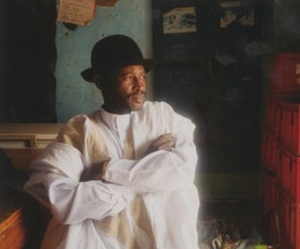Afel Bocoum Premieres New Track 'Dakamana'

In celebration of Malian songwriter and guitarist Afel Bocoum's forthcoming studio album Lindé-due September 4 via World Circuit Records and executive produced by Damon Albarn (Blur, Gorillaz) and World Circuit's Nick Gold-Bocoum is premiering the album track "Dakamana."
Listen below!
The song is a plea to Afel's fellow Malians to come together at a time when jihad, poverty and tribal war have brought the country to its knees. He explains: "Malian culture doesn't recognize divisive expressions such as: "northerner," "southerner," "black" and "white." Let's just say "Malian," full stop. Social cohesion is our social security." Alongside the gentle click of the calabash and the twang of the kamele n'goni (large "youth" harp), the song also features the trombone of Skatalites veteran Vin Gordon.
The first single taken from the record, "Avion," is a playful and optimistic tribute to air travel with the guitars of Mamadou Kelly, Oumar Konaté and Lamine Soumano providing sweet and melodic propulsion.
Named after the wild expanse near Afel's hometown of Niafunké, Lindé is a remarkable blend of deep tradition and audacious innovation. The album was recorded in Mali's capital Bamako, and stitches together the age-old music of the Niger bend with styles from across the globe, boasting performances from a number of eminent Malian musicians including Madou Kouyaté, the late 'Hama' Sankaré and Madou Sidiki Diabaté, along with the drums of recently-departed Afrobeat pioneer Tony Allen, the trombone of Vin Gordon (Bob Marley / Skatalites) and the violin of Joan as Police Woman.
Traditional instruments like the ngoni, njurkele, kora and calabash blend with guitars, percussion and call-and-response vocals. The result is a gently undulating flow that emanates from a source hidden deep in the historical and mystical traditions of Afel's native land, enriched along its way by musical tributaries and cross-currents. It's music that rolls rather than rocks, graceful, unforced and minimal by design.
Lindé is also an album with a message; in the face of an uncertain and turbulent world, and a homeland struggling with jihad, poverty and tribal war, Afel Bocoum urges hope, solidarity and unity. "We have to meet each other, talk to each other, look each other in the eye and tell the truth," Afel says. "If we're not united, I can see no solution. Our social security is music. That's all we've got left. People love music, so we have to make use of that fact."
Afel Bocoum is among the last of a breakthrough generation of African musicians who cross-pollinated their own traditional music with the new sounds that arrived from all over the world throughout the 20th century. Hailing from Niafunké in Mali, an area that straddles the cultural riches and political tensions between the northern and southern areas of the country, Afel spent decades touring and recording with desert blues pioneer Ali Farka Touré. His debut album Alkibar (1999, World Circuit) propelled him to international recognition, leading him to work with Albarn & Toumani Diabaté on 2002's Mali Music, as well as contributing regularly to the famed Africa Express projects and collaborating with Béla Fleck, Habib Koité, and Tartit Ensemble among others. "You have to collaborate, otherwise you'll get nowhere in today's world," Afel says. "All those collaborations were positive."
Photo credit: Christien Jaspars
Comments

Videos

